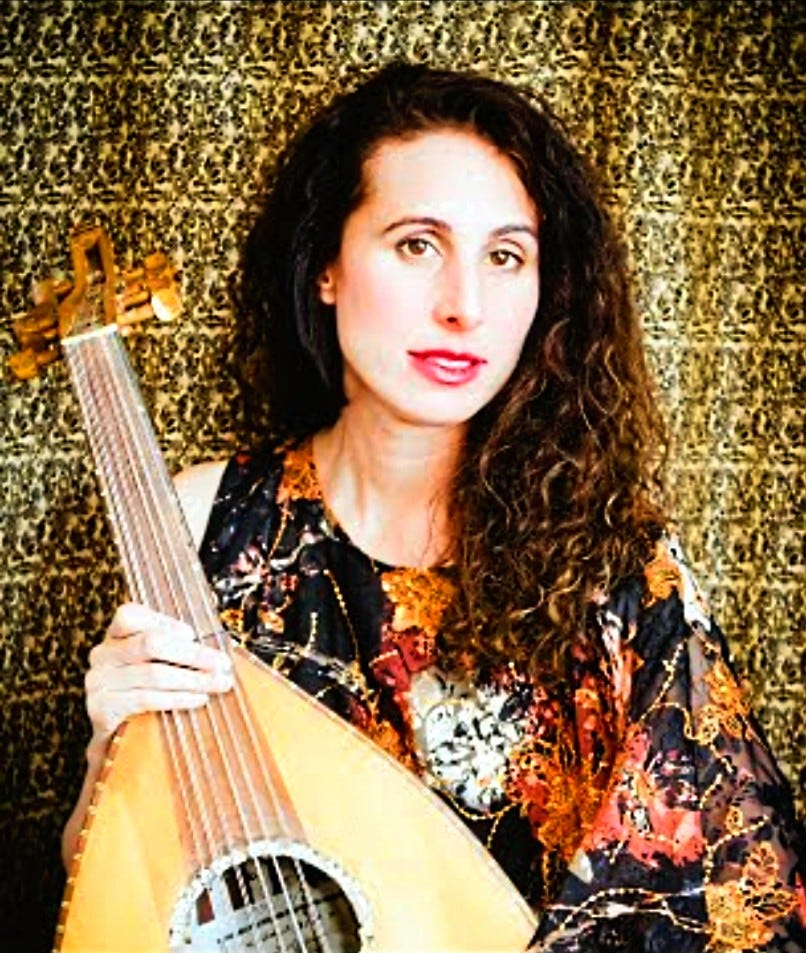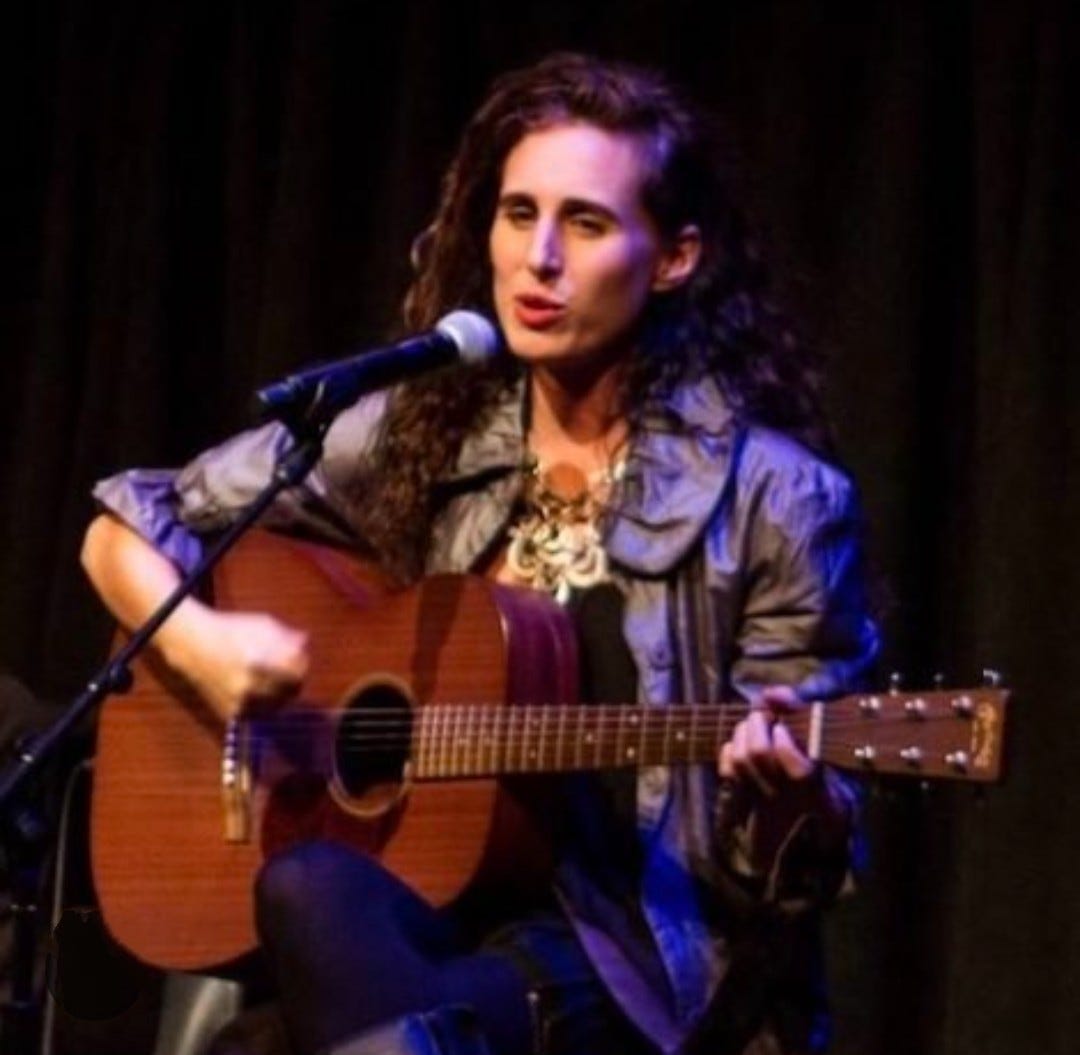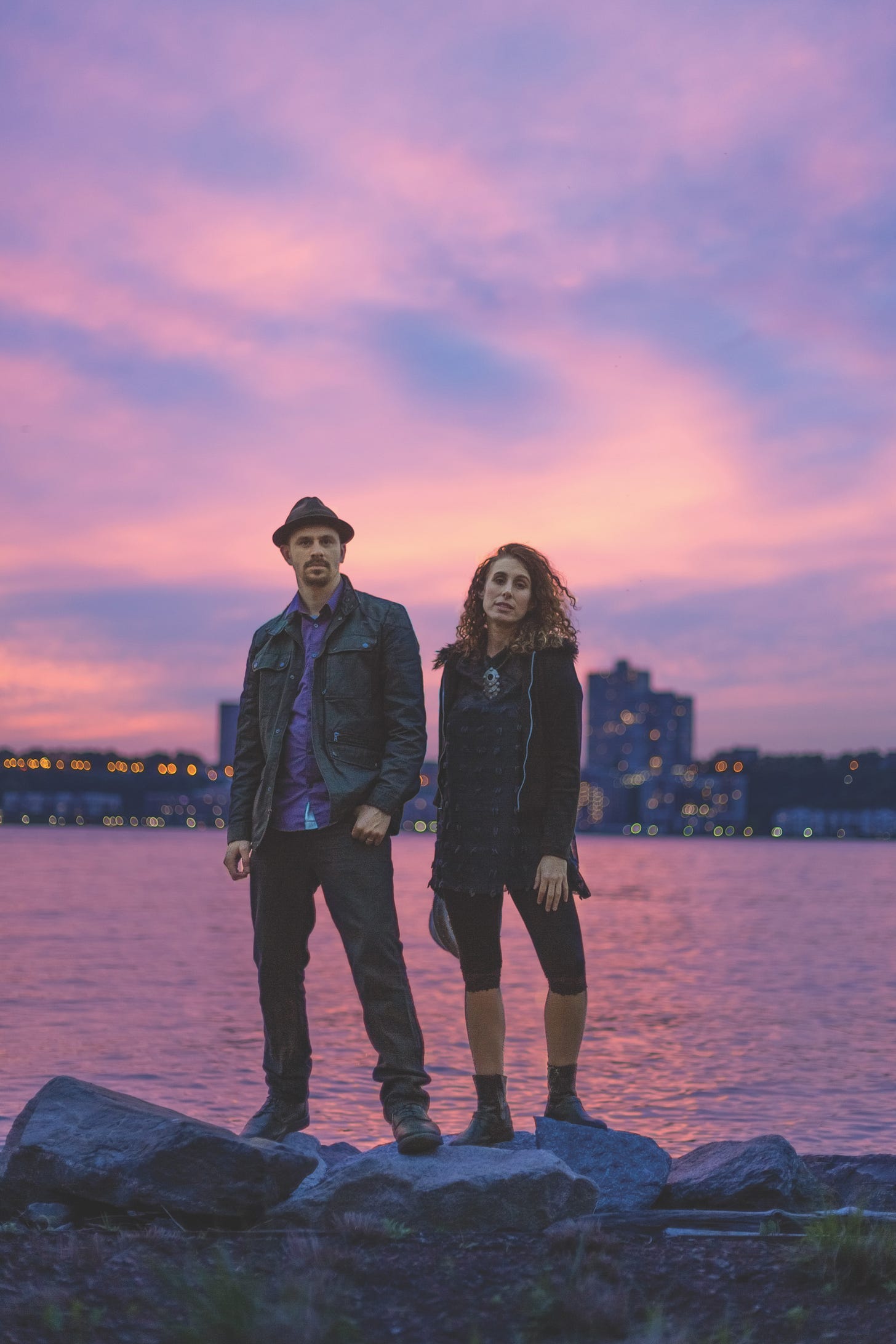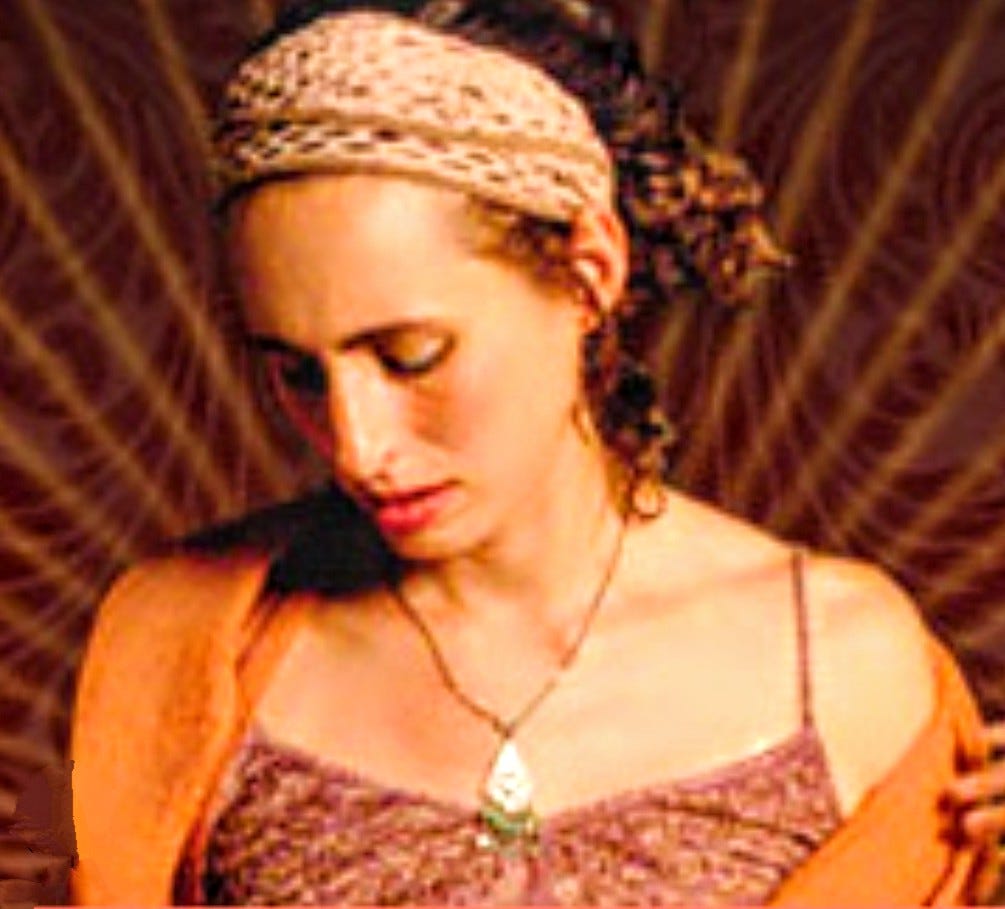“When I was really little, my original family of five lived on a dead end street overlooking a train yard. I had the most romantic feeling about those trains and dreamed of all the adventures I could have as a stowaway.
My parents married twice and divorced twice. Somehow my two brothers and I made it through the crossfire. When they split for the second and final time, my brothers stayed with our mom and I went to my father’s.
He married again and his new wife had eight kids from her first marriage. So there were three kids from him, eight from her, and then together they had seven more. (Kayn ahora, ptui ptui ptui.)
I grew up in Borough Park, Brooklyn, in an ultra-Orthodox world, and there was a lot of beauty in it. I went to Beis Yakov, which is an international school for Jewish girls, and there I learned a lot of Torah and Midrash. Everything in that life contributes to this texture of holiness and devotion and connection to a divine truth. And all that fills the lifestyle with light.
It was our custom that on Shabbos, in the morning, my father and I would always walk the four long avenues to shul. We would go to houses that were gutted by fires and just walk around and imagine who might have lived there and what their lives were like. My father loved music and had once wanted to be a musician, though he devoted only 6 months of his life to this dream. He had this self-imposed deadline: if he didn’t make it in the music business within six months, he would give up and do something else. And six months is nothing at all, so of course it was a doomed pursuit.
Anyway, we would sing together, harmonize. And in the winter, I would tuck my hand into his outside coat pocket for warmth. I loved the feeling on those mornings, which were full of warmth and coziness, Shabbos beauty and music.
Then one morning, when I was seven years old, my father told me that I was now at an age where it was inappropriate to put my hand inside the pocket of his coat.”
“In first grade, I was writing Hebrew and I was so excited that I’d written the prayer of Asher Yatzar, which is about all the orifices of the body being in working order. I wrote out the entire prayer in Hebrew and felt so proud of myself and went to show it to my teacher. But she started screaming at me for using G-d’s name when I hadn’t yet learned not to do that.
And that was kind of emblematic of huge swaths of my education. A lot of the creative pursuits that drew me in and lit me up could also get me in trouble. I loved to sing, but singing to a mixed or general audience was forbidden to girls. I loved to dance, but the natural way my body wanted to move was considered prost, or vulgar, improper. Even the simplest, purest activity like walking to shul with my father, singing in harmony, could be tainted with shame for something as innocent as tucking my seven-year-old hand into his coat pocket for warmth.
I realized early that the rigidity of the Judaism I was raised within was an obstruction to my G-d-given gifts and natural way of expressing what’s inside me. And so I had a choice: to either give voice and expression to what was given to me, or to repress and silence it.
I spent a lot of years trying to have it both ways. Like in high school, I would literally open the phone book and find secular dance classes and leave the house in my long-sleeved blouses and ankle-length skirts. At the studio, I’d change into dance clothes and at the end, I’d change back. It was both a blessing and a curse that my father and stepmother were much too preoccupied with their family of 20 (ptui ptui ptui) to pay close attention to anything I was doing.”
“I went to Israel after high school to study in a Yeshiva there, and that was my first taste of real freedom and exploration. It was my introduction to the secular music scene, and bars, and hitchhiking.
I was kicked out of Yeshiva because they had spies everywhere and my nightlife was decidedly not in keeping with the Orthodox lifestyle. I kept getting hauled into the director’s office. And there was nothing angry or punitive about these conversations. The poor man would look at me in this kindly sorrowful way, and shake his head, and in his quiet voice, he’d say: Basya, Basya… do you think this is working out? Do you think this is the place for you? And I had to admit the answer was no.
Once I was out of there, I decided – ironically enough -- to spend Passover in Egypt. I thought that would be an interesting vantage point from which to experience the exodus story. I went with three friends, and as we were coming out of a KFC in Cairo of all places, this Middle Eastern music was blasting from the outdoor speakers and the moment I heard it, I was electrified. In an instant I knew: this is my music.
The groove of it, the beat, the sensuality: there was something in my body that started to respond of its own accord to the way the rhythm and the melody affected me. It was entirely inside me, as if it were inside my DNA from eons ago — generations and generations ago. I was being filled up by something I was made out of – my spirit.
And then a day or two later, I heard the same kind of sound in the Cairo Market where people were actually playing instruments live. It was like a swirl of music, a kaleidoscope. Right there in the market, I donned the pieces of a belly dancing outfit and started to dance and felt that music come straight through me.
Egypt was really the gateway to understanding that I was a musician myself. It was in the Sinai Desert that I first started playing around on different drums.
I played percussion instruments before I ever got into strings. Sometime later, when I was hung up on this guy who’d moved to California, I found a flier about a Middle Eastern music and dance camp in Mendocino, California and I used that as a reason to go west. There I was introduced to the doumbek and riq, the saz and the oud, and I fell in love with all these instruments and everything else about this camp. Which was fortunate, because I when I did meet up with that love interest afterward, it was a total fiasco.”
“Back in the United States, I applied to Barnard and was accepted with a partial scholarship. And the college really offered me a way of remaining in that hybrid state, with one foot in the Orthodox world and one in the secular.
It was an all-women’s school and there were so many young Orthodox women there. We found each other instantly and shared housing and kept kosher. There was a kosher dining hall and I took all my meals there. So even though it was a secular school, it offered me ways to remain insular to a very considerable extent.
But at Barnard, my creativity was nurtured instead of stifled. My teachers were open to my experimental bent. I learned to play the guitar in college and started to write songs while I was there. And it was as if a kind of fever took hold of me. All day long, whenever I was in classes or doing something else, all I wanted was to get back to my guitar. I pined for it, couldn’t stay away from it, couldn’t get enough. Every waking hour and then some, I was eating, breathing, dreaming music. I never had any kind of formal training at all. I’m almost entirely self-taught. I just learned to play by obsessively doing it during every spare moment I had for many years.
By my senior year, it was clear to me that I had to make a real choice. I was putting a band together and it was a trio, with myself and two young men. And we would be rehearsing for long hours and performing for mixed audiences. All of which was completely out of keeping with the moral tenets of my Orthodox community.
I was so deeply torn and spent so many sleepless nights agonizing over this fork in the road. Part of me wanted very much to remain religious and in the fold. But the deepest, most essential part of my spirit couldn’t find full expression within those confines. And finally, on a spiritual level, I felt called to do what it seemed to me that I had been created to do. But that doesn’t mean it wasn’t excruciating to leave. I had a lot of doubt and a lot of guilt. It took years before I could fully understand and embrace the idea that the path I took has no less Jewish integrity or holiness than the one I left.”
“When I first put together a band, we couldn’t think of a name, so we called ourselves Temporarily Anonymous. For me, it was kind of a hopeful double entendre. Because of course I myself was a total unknown, and I was hoping that was a temporary situation.
When the pharaoh’s daughter rescued Moshe from his river basket, she was renamed Basya, which breaks down into Bas – which means daughter — and Ya, which means G-d. So Basya means daughter of G-d. This was because, in the act of defying her father to save this Hebrew baby, she recognized there was an authority that was higher than his. So this is the story of my name in Judaism.
The name Pharaoh’s Daughter — which was the brilliant suggestion of Tracey Love, our flutist at the time — really represents an integration of all these different facets of my life: my actual Jewish name; my roots in Torah and other Jewish texts; my own Exodus story involving Egypt; the girl who defied her father and in so doing, was answering in her own way to a higher authority.”
“When I’m composing, I find a kind of meditative groove, or a riff I’m working within, and I’ll stay there for a really long time, sometimes hours on end. And often I’ll find or create a kind of musical language or journey within that riff.
I often have to be in motion for music to come to me. Once when I was very blocked, I went out and got on a Citibike and started to ride and sure enough, a melody came to me. I rode for a long time and I had the whole song and I just needed to record it, but what happened was that when I went to dock the bike, the meter was broken and I had to call the company and tell them that so they wouldn’t charge me and by the time I hung up, the melody had fled my mind. I couldn’t recover it.
And then I had an appointment, so I had to put the whole endeavor aside for an hour or so. When I got out, I still could not remember a shred of the song. I was clutching my head, racking my brain, scouring my memory for a riff, a trace, anything. Nothing. In desperation, I rented another bike and got back on and rode and rode and rode, and it came back and I recorded it as fast as I could.
Another time, I’d been hired to scout locations for a photographer in Portugal, and I was walking around this castle banging out a melody on my leg the whole time. By the time I got on the train afterward, I had the whole song. And all the way back on that train, I kept singing and banging it out on my lap so I wouldn’t lose it before I could record it.”
“When I started writing songs in college, they were very literary, though there was a Jewish sensibility about them even then. But when I became very taken with Middle Eastern instruments, I found that English no longer fit the sound. And then I did so much traveling that all these world beats started infiltrating my compositions.
My craving for international travel was almost as intense as my drive to create music, maybe because I intuitively knew I would need to travel the world to find all the facets of my sound. I went all over Eastern Europe, all over the Middle East and Africa, and everywhere I went, I brought back new forms of musical innovation and composition.
Eventually, because English no longer worked within the music I was creating, I found myself turning to all these ancient texts and teachings I’d memorized in childhood. I started playing with the phrases and passages that spoke most directly to me. Like Hillel’s three questions:
Im ein ani li, mi li? If I am not for myself, who will be for me?
U'kh'she'ani le'atzmi, mah ani? If I am only for myself, what am I?
V'im lo 'akhshav, eimatai?And if not now, when?
I think those questions haunted me because to me they represented the ways I continually felt torn as a musician. I kept toggling back and forth between the fear that doing this kind of work was self-absorbed, just navel-gazing, and the conviction that music was a profound gift that singers and songwriters offered to others, because I knew how many times someone else’s music had comforted and sustained and saved me.
That piece showed up on an album called Out Of The Reeds, which was entirely in diasporic languages: Yiddish, Ladino, Aramaic, Hebrew.”
“Becoming a chazan [cantor] was a decision I made once I was on the path to single motherhood. I desperately wanted a child and I knew that my lifestyle of touring and performing and recording was not conducive to structure or stability. Meeting renowned Chazan Jack Kessler (z”l) drew me to cantorial school. His depth of knowledge, energy, and passion made me feel that bringing my voice into community service was a natural next step for me, and full of creative possibilities. So I was a chazan at Romemu for nine years — serving, at various times, at both the Upper West Side of Manhattan and Brooklyn locations — and the experience of being there showed me for the first time what being part of a community could be. It cured me of my resistance to that, which stemmed from my upbringing.
I’d grown up with the idea of community as a structure that was at least as repressive as it was supportive. But that wasn’t at all true of the Romemu community. The congregants there loved being together, and singing together, and sharing a space. And the overwhelming majority of them were people of incredible depth. It was a room full of spiritual seekers and grapplers. Many were in pain, or engaged in some very profound struggle. And there was something inexpressibly powerful about being a part of that and leading them in prayer. It was a different kind of Jewish extended family and a very healing one.
I should add that Romemu is a Renewal shul. Renewal is a path that’s informed by mystical traditions: deep Hasidic storytelling and music, gnoticism, sufism, Buddhism. It’s very experiential; it taps into things I’m naturally interested in myself. So it was a Jewish path that felt like a really good fit for me. Zalman Schechter Sholomi -- who essentially coined the term Renewal and created the path – resisted the word “denomination” to describe it. He felt “denomination” was a misnomer because you could be Orthodox and Renewal, or Reform and Renewal, or anything in between. Renewal as a path is open to any Jew.
As a member of the clergy, I wasn’t great about maintaining that whole fourth wall between myself and the congregation. I didn’t see myself as different from them. I mean, I happen to sing and play a few instruments, but everyone there did something that was beautiful and meaningful, so it felt very incidental to me that I was standing on the bimah while they were in the pews. Sometimes I was criticized for not having that fourth wall up, but it didn’t come naturally to me.
I was also at the Fire Island shul. It’s a very cozy, haimish community where you can be experimental, and I’ve performed there with Eprhyme, a rapper I often collaborate with. He was at the shul one day when I was practicing a song and he just started to rap along. It was like an impromptu vocal jam session. From there, we just started writing Kabbalat Shabbat songs. And then we just performed them that Friday night.”
“Becoming a mother changed me completely. I went from being very self-oriented to totally revolving around my son. To say it’s a continual challenge is the understatement of all time, but it’s also been the deepest source of healing for me. I think I’ve lived my entire life with a certain grief that was always spilling over, spilling out of me, and somehow the only antidote to that grief was becoming a mother and bringing a child into the world. I don’t know why. Orthodox girls are indoctrinated to want marriage and children from the earliest adulthood, and I don’t know why that stuck when I was able to shed so many other aspects of my upbringing.
At some point, I realized I didn’t have to have a partner to become a parent – and in fact, I felt much more urgency around the idea of having a child than I did around having a partner. And Romemu was a wonderful place for me as a single mother. Saadya, my son, was the baby of the whole community. So many of the people there felt like family to him.
There were countless times when I was leading a prayer service and I hadn’t been able to find a babysitter, but it didn’t matter; he just floated around the shul with a posse of kids the whole time. In Orthodox shuls, the kids are often running around during services and even making lots of noise and nobody minds. And Romemu had some of that culture even though it’s progressive and most progressive shuls don’t share that attitude toward children. So that felt really good to me.”
“Every musician has a different artistic signature and core strength. Bob Dylan is primarily a lyricist. Leonard Cohen was a lyricist. My best work really takes the form of melody and musical patterns. And one thing I do is: I use a musical pattern as a vehicle to go into a certain zone, and once I’m in that zone, it’s like I’m not there anymore. And things happen in that space of their own accord. It’s an altered state of consciousness, almost like a trance. And when I’m able to give myself that time, that space, that experience, I can access melodies that feel as if they’ve come to me from someplace else. I have the experience of being a channel for… Source, Spirit. The Mystery.
Judaism is a spiritual path that’s full of yearning. Being tasked with writing insights and new commentary on the parsha for each week, and intentions for prayers, allows me to tap into insights that connect me to the Torah, and weave together the personal and universal currents of what’s happening in the world. My recent music tends to be inspired by spiritual texts, and creating music to accompany those texts lets me steep in esoteric spiritual teachings. Because I do so much composing with the body, it lets them enter me on the most visceral level, makes them a part of me.”
“I’m working on several different new projects right now.
I’m collaborating with Eprhyme as Darshan in setting the teachings of Nachman of Breslov to music and rap.
I’m also in collaboration with Avi Fox Rosen, to record our settings of the Yiddish poetry of Itzik Manger from Khumesh Lider, with a small ensemble.
And I’m beginning a three-week course of Aramaic chants that I wrote to diffeerent texts in the Zohar, which will eventually also become a musical recording.
Finally, I’m fundraising right now for a new album called Songs of Desire, which I describe as a “sonic midrash,” a commentary written not in words but in sound, layering ancient melodies with new interpretations. Think klezmer meets trance, Middle Eastern maqam, West African pulses, sacred text on oud, whispers of Hebrew refracted through electric strings, mingling with a Brooklyn beat.”
✡️
To read more about Basya’s current work, and to support this project, please visit this link.









Fellow Barnard grad here. Interesting to read about your reaction to the music in Cairo. My son, Dr. Hayim Katsman z''l, killed on October 7 on his kibbutz, was exposed to Arab electronic music while studying for a doctorate in Seattle. When he returned to Israel, he organized parties in which he played (as DJ) exclusively Arabic music.
I enjoyed reading your story.
Hannah
I've been lucky enough to know Basya for close to 35 years, but still learned some things about her in this piece that I didn't know before.
We are so blessed to have in our midst the font of creativity, talent and deep wisdom that is Basya.